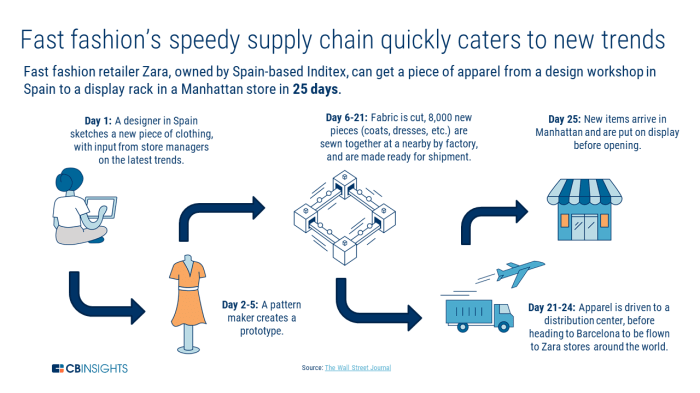The retailer Zara is incorporating new technologies and processes to revolutionize its operations and customer engagement, setting the stage for a transformative retail experience. From the seamless integration of online and offline channels to the adoption of artificial intelligence and virtual reality, Zara is pushing the boundaries of innovation to redefine the future of retail.
Zara’s strategic implementation of these cutting-edge technologies aims to enhance customer convenience, optimize operations, and gain valuable insights into consumer behavior. This comprehensive approach not only drives sales but also fosters a deeper connection with customers, creating a personalized and engaging shopping journey.
The Implementation of Artificial Intelligence (AI)

Zara is incorporating AI into its operations to enhance customer experiences and optimize business processes.
Specific applications include:
- Personalized recommendations based on customer browsing history and purchase patterns.
- Virtual assistants providing real-time support and answering customer queries.
- Inventory management systems using AI algorithms to predict demand and optimize stock levels.
AI integration offers benefits such as increased customer satisfaction, improved operational efficiency, and data-driven decision-making. However, challenges include data privacy concerns, ethical considerations, and the need for ongoing investment in AI infrastructure.
The Adoption of Omnichannel Retailing: The Retailer Zara Is Incorporating New Technologies And Processes To
Zara is implementing an omnichannel strategy to seamlessly integrate online and offline shopping experiences.
Benefits include:
- Increased customer convenience through multiple shopping channels.
- Improved inventory management by sharing stock across channels.
- Personalized marketing campaigns targeting customers based on their omnichannel behavior.
Challenges include coordinating inventory and pricing across channels, ensuring consistent customer experiences, and managing the logistics of omnichannel fulfillment.
The Use of Data Analytics and Customer Insights
Zara leverages data analytics to gain valuable insights into customer behavior and preferences.
Data is used to:
- Improve product design by identifying popular styles and trends.
- Personalize marketing campaigns by targeting specific customer segments.
- Optimize store operations by analyzing customer traffic patterns and sales data.
Data privacy and ethical considerations are crucial in Zara’s data analytics practices, ensuring customer information is protected and used responsibly.
The Adoption of Sustainable Practices
Zara is committed to sustainability throughout its operations and supply chain.
Initiatives include:
- Reducing waste through initiatives such as using recycled materials and minimizing packaging.
- Using eco-friendly materials such as organic cotton and sustainable fibers.
- Promoting ethical sourcing by partnering with suppliers who adhere to labor and environmental standards.
Challenges include balancing sustainability with cost and consumer demand, ensuring transparency in the supply chain, and addressing the environmental impact of fast fashion.
The Use of Virtual and Augmented Reality (VR/AR)

Zara is exploring VR/AR technologies to enhance customer engagement and product visualization.
Applications include:
- Virtual fitting rooms allowing customers to try on clothes virtually.
- Interactive product demonstrations providing detailed information and immersive experiences.
- In-store AR experiences guiding customers through product displays and offering personalized recommendations.
Benefits include increased customer engagement, improved product visualization, and enhanced shopping experiences. However, challenges include hardware limitations, technical complexities, and the need for user-friendly interfaces.
The Integration of Mobile Technologies

Zara is leveraging mobile technologies to improve customer convenience and drive sales.
Specific applications include:
- Mobile shopping apps offering a seamless shopping experience on smartphones and tablets.
- Store locators helping customers find nearby stores and check product availability.
- Personalized notifications informing customers about new arrivals, promotions, and exclusive offers.
Mobile technologies have significantly impacted Zara’s customer engagement, revenue generation, and overall brand presence.
Frequently Asked Questions
What are the specific AI applications Zara is utilizing?
Zara employs AI in various forms, including personalized recommendations, virtual assistants, and inventory management systems.
How does Zara leverage data analytics to improve its operations?
Zara analyzes customer data to enhance product design, optimize marketing campaigns, and streamline store operations, gaining valuable insights into consumer behavior and preferences.
What are the key challenges Zara faces in implementing an omnichannel approach?
Zara must overcome challenges such as inventory synchronization, consistent customer experience across channels, and the integration of online and offline sales data.